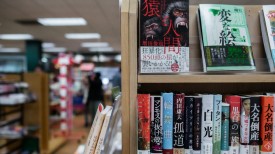Dana Becker's New Book Focuses on Changing Definition of Stress
Dana Becker talks about the changing definition of stress in her new book titled "One Nation Under Stress: The Trouble With Stress as an Idea".
Stress has been given a lot of importance in the current times. Studies have been conducted on it and companies have implemented new strategies to relieve stress among workers. However, author Dana Becker, a professor of social work at Bryn Mawr, says that back in the day, stress had a different meaning. According to the author, Americans these days are more obsessed with curing stress rather than identifying what causes it.
In her new book "One Nation Under Stress: The Trouble With Stress as an Idea", she addresses the changing definition of stress and talks to NPR about the origins of the concept of stress, how "stress inflation" is affecting society, and why just eating more kale isn't enough.
On the history of the idea of stress
"If we think back to the middle of the 19th century, George Beard, who coined the term neurasthenia, was really the first in this country to talk about American nervousness. ... Of course, he didn't call it stress then. But the idea was that a lot of physicians were finding that they had middle-class patients who seem to be falling by the wayside with all of these things they were calling 'nervous disease' at the time. And Beard felt that it was really the fast pace of American life that had really caused people to feel nervous in this way.
"... I think that he and folks who came after him had the idea that it was - stress was what was outside, you know, that the conditions were more important to talk about. And then we can certainly talk about the illness, and now it seems that we've shifted, really brought that outside in. So we become preoccupied with risks to our health and our mental health, our psyches, and we lose sight of the conditions that really create the stress in the first place."
On stress as both a culturally defined idea and an experience
"It's definitely an idea. It's not a thing out there. It's an idea. And it's an idea that has a certain currency. And it shapes, really, the way we talk, the way we think about ourselves, and the way we think about our relationship to the world, really.
On why stress inflation is a societal problem
"Well, I think, having read a lot of what the media has had to say about stress, it feels like we're using the term to cover just about everything, from a hangnail to the war on terror. But the way that we react to stress also affects the way we are in the world, the way we act, the kinds of options that we have for how to behave. But I don't think anybody is really to blame. It's really about an idea that's taken hold, and it has its cultural moment.
On whether it's wrong to see stress reduction as a personal pursuit
"I think it's fine. I actually don't think there's a problem. I think it's at both ends, right? You know, we've become so preoccupied with our health and the risks there are to our health that I just fear that it rather obscures, sometimes, what we might be looking at as the social conditions that create the stress. And it can sap us of our energy to do that. I'm not suggesting it's not a good thing for us to take care of ourselves. It certainly is that.
"...[It's] really useful to consider, especially now in a world where uncertainty is really king or queen, you know, that we want to control what we can control. And it's difficult for people to think in these large terms, in these social terms. But I guess my argument is that we need to do both, and that we want to understand the part that this whole discourse about stress and this whole idea of stress plays in the way we've come to think about our problems."
© 2023 Books & Review All rights reserved.
Popular Now
1
Books to Read After 'Fourth Wing': Top Picks for Fantasy and Romantasy Fans

2
‘The Secret Public’ by Jon Savage Book Review: An Insightful Look Into the LGBTQ Influence

3
Stephanie Regalado's 'If They Only Knew' Column Is Now A Book, Unleashing 60 Anonymous True Stories to Empower Women

4
'No Wire Hangers' Scene That Almost Did Not Happen: New Book Reveals Faye Dunaway's Struggles

5
Rare First Edition of Aphra Behn's Novel 'Oroonoko' Discovered in Kent: A Historic Literary Find

Latest Stories
Book Reviews
‘The Secret Public’ by Jon Savage Book Review: An Insightful Look Into the LGBTQ Influence

Book News
Stephanie Regalado's 'If They Only Knew' Column Is Now A Book, Unleashing 60 Anonymous True Stories to Empower Women

Book News
'No Wire Hangers' Scene That Almost Did Not Happen: New Book Reveals Faye Dunaway's Struggles

Book Reviews
‘The Perfect Couple’ by Elin Hilderbrand Book Review: A Captivating Summer Mystery

Book News
New Book ‘The Franchise’ Reveals Penguins President Kyle Dubas’ ‘Biggest Mistake’ as Maple Leafs GM











